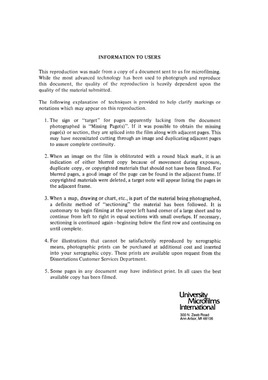| dc.contributor.author | Hatfield, John N., | en_US |
| dc.date.accessioned | 2013-08-16T12:28:56Z | |
| dc.date.available | 2013-08-16T12:28:56Z | |
| dc.date.issued | 1983 | en_US |
| dc.identifier.uri | https://hdl.handle.net/11244/5148 | |
| dc.description.abstract | This study was to determine whether meaningful data could be obtained from an interagency designed needs assessment for use in planning adult and community education activities in the Oklahoma City area. A search of the literature revealed that many educators lack an understanding that needs assessment is a part of the decision making process. Sound decisions are based on valid and reliable data which can be used to help bring about the needed changes to improve the quality of life of people in a community. Due to the lack of simple and flexible needs assessment instruments, some authorities recommend that committees may be better off developing their own needs assessments which can reflect the uniqueness of their own areas. | en_US |
| dc.description.abstract | The CECLL "Needs Assessment Instrument" identifies nine major problem areas covering lifelong learning activities and information sources. The needs assessment included 69 specific items in nine general problem areas, plus the supportive services required for program participation. This study measured significant relationships between the projections of 26 local agencies of the Community Education Consortium for Lifelong Learning (CECLL) with the positive responses of 186 community households. Results of the study revealed that the CECLL "Needs Assessment Instrument" produced meaningful data that can be used in the decision making process for lifelong learning activities. Using SPSS and sub-programs to measure agreement, 75% significant agreement was identified at .05 level. High percentage of agreement may reflect a reduction in agency biases through an interagency agreement to cooperate in the needs assessment process. The simple and flexible design of the needs assessment used in this study, along with its degree of validity and reliability, may be helpful to other similar communities or agencies interested in developing a needs assessment without starting from scratch. | en_US |
| dc.format.extent | xi, 106 leaves : | en_US |
| dc.subject | Education, Adult and Continuing. | en_US |
| dc.title | Analysis of interagency needs assessment for adult and community education. | en_US |
| dc.type | Thesis | en_US |
| dc.thesis.degree | Ph.D. | en_US |
| dc.thesis.degreeDiscipline | Jeannine Rainbolt College of Education | en_US |
| dc.note | Source: Dissertation Abstracts International, Volume: 44-06, Section: A, page: 1663. | en_US |
| ou.identifier | (UMI)AAI8324876 | en_US |
| ou.group | Jeannine Rainbolt College of Education | |
